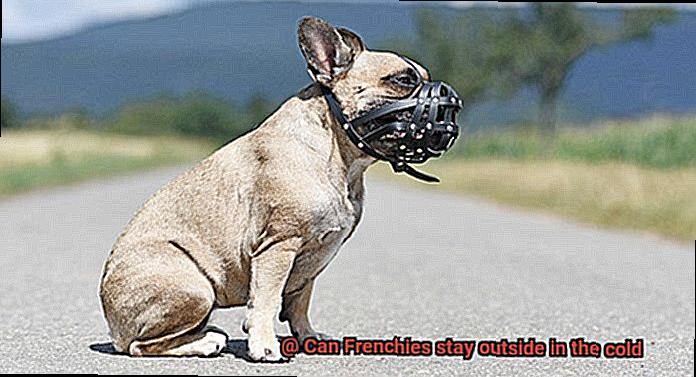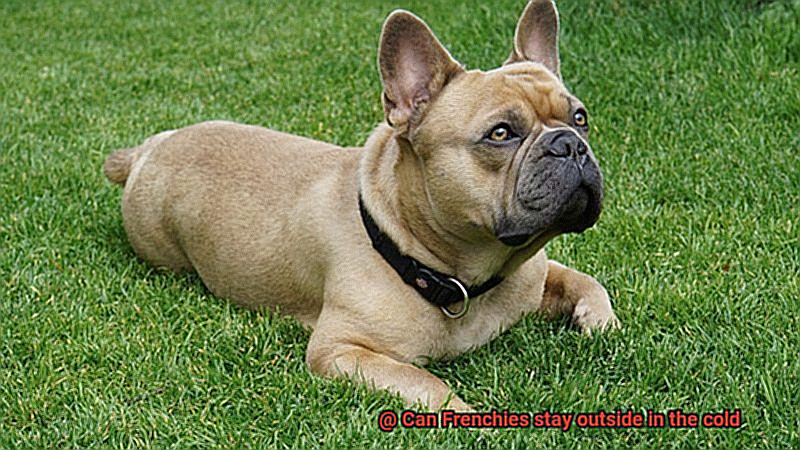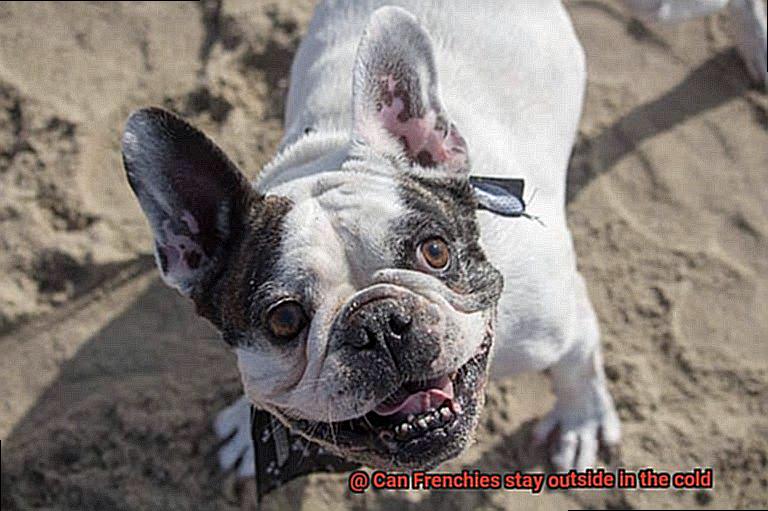Can Frenchies stay outside in the cold?
Ever wondered if those adorable French Bulldogs, affectionately known as Frenchies, can handle the frosty winter weather? Well, you’ve stumbled upon the perfect spot. Get ready to uncover the truth about these pint-sized pooches and their ability to conquer the cold.
French Bulldogs, with their endearing bat-like ears and unmistakable snorts, steal our hearts without fail. But their unique physique raises some questions when it comes to freezing temperatures. While some pups were bred for icy landscapes, Frenchies originally hail from warmer regions, leaving us curious about their cold resilience.
So, can these little darlings survive outdoors in chilly conditions? We’re diving deep into their ancestry, physical traits, and frosty tolerance to separate fact from fiction. Prepare to debunk a few myths and unveil some surprising truths about our furry companions.
Join us on this delightful journey into the world of French Bulldogs and their frosty escapades. Whether you’re a proud Frenchie parent seeking reassurance or simply intrigued by these charming canines, this blog post guarantees an eye-opening experience. Bundle up tight, grab a steaming cup of cocoa, and get cozy as we unlock the secrets behind Frenchies and the cold weather conundrum.
Factors that Determine Whether Frenchies Can Stay Outside in the Cold
Contents
- 1 Factors that Determine Whether Frenchies Can Stay Outside in the Cold
- 2 Severity of the Weather
- 3 Individual Dog’s Tolerance to Cold Temperatures
- 4 Age and Health Considerations for French Bulldogs in the Cold
- 5 Providing Protection for Frenchies During Cold Weather
- 6 Investing in a Well-Insulated Dog House or Shelter
- 7 Appropriate Winter Clothing for French Bulldogs
- 8 Limiting Outdoor Time During Extremely Cold Weather Conditions
- 9 Conclusion
French Bulldogs, or Frenchies, are beloved companions known for their playful and affectionate nature. However, when it comes to cold weather, these adorable pups have some limitations. In this blog post, we will explore the factors that determine whether Frenchies can stay outside in the cold. By understanding these factors, you can ensure your Frenchie stays warm and safe during chilly weather.
Breed Characteristics:
French Bulldogs have a short coat and minimal body fat, making them less tolerant of cold temperatures. Their brachycephalic (short-nosed) structure also affects their ability to regulate body temperature effectively. It’s important to recognize that Frenchies are not built for extreme cold conditions and require extra care in colder weather.
Temperature:
Consider the specific temperature range and duration when deciding if it is safe for your Frenchie to be outdoors. Mild to moderate cold temperatures can be tolerated for short periods, but extreme cold should be avoided. Always prioritize your Frenchie’s comfort and well-being.
Wind Chill:
Wind chill can make the temperature feel much colder than it actually is. French Bulldogs are more susceptible to wind chill due to their short coats, which provide less insulation against the cold. Take wind chill into account when assessing whether it is safe for your Frenchie to be outside.
Acclimatization:
Acclimatization refers to gradually exposing your Frenchie to colder temperatures over time. This process allows them to develop some tolerance to the cold. However, consult with a veterinarian before attempting acclimatization, as it requires careful supervision and proper precautions.
Age and Health:
Puppies, senior dogs, and those with underlying health conditions are more vulnerable to cold weather. Their bodies may not regulate temperature efficiently, making them more prone to hypothermia and other cold-related issues. Consider your Frenchie’s age and overall health when deciding whether they can safely stay outside in the cold.
Shelter and Protection:
Providing a well-insulated dog house or shelter is crucial if your Frenchie will be spending time outdoors during cold weather. Ensure the shelter is elevated off the ground and draft-free. Adding blankets or bedding inside can help your Frenchie stay warm. Additionally, consider fitting them with a cozy dog sweater or jacket for extra insulation.
Monitoring and Supervision:
Regardless of the factors mentioned above, always monitor your Frenchie closely when they are outside in the cold. Look for signs of discomfort, such as shivering or seeking warmth. If you notice any concerning symptoms, bring your Frenchie indoors immediately.
Severity of the Weather
French Bulldogs, with their adorable looks and playful personalities, are beloved by many dog owners. But when it comes to cold weather, their short coats and small size can make them more susceptible to the chill.
In this blog post, we will explore the impact of weather severity on how long French Bulldogs can stay outside in cold temperatures. We’ll provide you with accurate and helpful information to ensure your Frenchie stays warm and safe during winter.
Understanding French Bulldog’s Tolerance to Cold Weather:
- Breed Characteristics: French Bulldogs have short coats and a compact body, making them less equipped to handle cold temperatures compared to larger, long-haired breeds.
- Weather Factors: The severity of the weather, including temperature, wind chill, and moisture levels, can affect a Frenchie’s ability to withstand the cold.
- Hypothermia and Frostbite: French Bulldogs have limited ability to regulate their body temperature, making them more vulnerable to hypothermia and frostbite in extreme cold conditions.
Tips for Keeping Your Frenchie Warm:
- Limit Outdoor Time: It is recommended to limit the time your Frenchie spends outside during cold weather.
- Provide Proper Protection: Outfitting your Frenchie with a warm coat or sweater can help protect them from the cold.
- Shelter and Heated Space: Ensure your Frenchie has access to shelter and a heated space in extreme weather conditions.
- Consider Individual Factors: Take into account your Frenchie’s age, health, and overall condition when determining their tolerance for cold weather.
- Monitor for Discomfort: Keep an eye out for signs of discomfort or distress such as shivering or seeking warmth indoors.
Keeping Your Frenchie Indoors in Harsh Winters:
- Consult with a Veterinarian: Consulting with a veterinarian is always recommended to determine your Frenchie’s specific needs in cold weather.
- Harsh Winter Areas: If you live in an area with harsh winters or regularly experience freezing temperatures, it may be best to keep your Frenchie indoors during those times.
- Warm and Cozy Environment: Provide your Frenchie with a warm and cozy environment indoors to ensure their well-being.
Individual Dog’s Tolerance to Cold Temperatures
As winter approaches, it’s crucial to understand how our furry friends handle the cold. French Bulldogs are undeniably adorable, but their short coats and unique physiology make them more sensitive to chilly temperatures. In this blog post, we’ll delve into the factors that influence a Frenchie’s tolerance to the cold and provide practical tips to keep them warm and comfy.
Factors Affecting Tolerance to Cold:
- Age: Just like us, French Bulldogs’ tolerance to cold can change with age. Puppies and senior dogs are generally more susceptible to the cold due to their less developed or declining ability to regulate body temperature effectively.
- Size: Size matters. Smaller French Bulldogs have a larger surface area-to-body mass ratio, making them more vulnerable to heat loss in colder climates.
- Coat Type: While Frenchies have a short coat, some may have a thicker undercoat that provides additional insulation. However, dogs with thinner coats or shorter hair may need extra protection from the cold.
- Overall Health: A Frenchie’s general health plays a significant role in their ability to tolerate cold temperatures. Poor health or certain medical conditions can compromise their body’s natural thermoregulation abilities.
- Conditioning: Dogs that are acclimated to colder climates through regular exposure and conditioning tend to have better tolerance. However, it’s important not to push your Frenchie beyond their comfort limits.
Understanding Brachycephalic Challenges:
As proud owners, we know that French Bulldogs have adorable squished faces and unique respiratory systems. However, their brachycephalic nature makes it harder for them to regulate body temperature efficiently. Extreme weather conditions can pose a greater risk to their well-being.
Signs of Discomfort:
Our furry friends can’t speak, but they communicate with us through their body language. Look out for signs such as shivering, seeking warmth or shelter, decreased activity levels, or reluctance to go outside. If you notice these signs, prioritize their warmth and comfort.
Protective Measures:
- Provide Indoor Shelter: Ensure your Frenchie has a cozy and warm spot indoors, away from drafts and cold floors. Consider using a doggy bed or blanket to create a snug den-like space.
- Dress Them Up: Doggy sweaters or coats are not only fashionable but also functional. These adorable garments provide an extra layer of warmth and protection against the cold.
- Limit Outdoor Exposure: French Bulldogs are not built for prolonged exposure to extreme cold or harsh weather conditions. Be mindful of the temperature and weather forecast before letting your Frenchie outside.
Age and Health Considerations for French Bulldogs in the Cold
French Bulldogs are adorable and lovable companions, but their unique physiology requires special attention when it comes to cold weather. In this article, we will discuss the age and health considerations for French Bulldogs in the cold, providing you with valuable insights to keep your furry friend safe and warm.
Puppies and Elderly French Bulldogs:
- Puppies have less body fat and a less developed immune system, making them more vulnerable to the cold. It’s important to limit their exposure and provide extra warmth.
- Elderly French Bulldogs may have weaker immune systems and struggle to maintain their body temperature due to age-related conditions. They should be kept indoors during chilly weather.
Brachycephalic Breed Challenges:
French Bulldogs are a brachycephalic breed, meaning they have a flat face and shortened airways. This can make it more difficult for them to regulate their body temperature in extreme weather conditions. Be cautious of this when exposing them to the cold.

Specific Health Conditions:
French Bulldogs with respiratory problems or arthritis may be more sensitive to the cold. Cold temperatures can exacerbate respiratory issues and cause joint pain or stiffness in dogs with arthritis. Monitor their comfort level closely.
Shelter and Protection:
- Provide adequate shelter and protection for your French Bulldog if they need to be outside in the cold. Insulated dog houses or heated blankets can help keep them warm.
- Ensure that their water does not freeze and that they have access to fresh food.
Regular Check-ups:
Regular check-ups with a veterinarian are crucial for monitoring your French Bulldog’s health, especially in relation to their ability to withstand cold weather. Your vet can provide personalized advice based on your dog’s specific needs.
Remember, each French Bulldog is unique, and their tolerance to the cold may vary. Pay attention to signs of discomfort or distress, such as shivering, lethargy, pale gums, or difficulty breathing. If you notice any of these signs, move your dog to a warmer environment immediately.
Providing Protection for Frenchies During Cold Weather
As an expert in French Bulldogs and their needs, I understand the importance of keeping these adorable pups safe and comfortable, especially during cold weather. Frenchies, with their short coats and brachycephalic faces, are not well-suited for chilly temperatures. They have difficulty regulating their body temperature, making them more susceptible to the cold. That’s why it’s crucial to provide them with proper protection when the weather turns frosty.
Indoor is Ideal
First and foremost, it is generally recommended to keep your Frenchie indoors during cold weather, particularly if the temperature drops below freezing. The controlled environment of your home will ensure that they stay warm and cozy.
Outdoor Protection
If your Frenchie must be outside for short periods, it’s vital to provide them with proper protection. Here are some tips to help you keep your furry friend safe and comfortable:
- A Snug Shelter: Make sure your Frenchie has a well-insulated and windproof dog house or shelter. It should be elevated off the ground to prevent contact with cold surfaces. Ensure it is small and snug enough to retain heat but still allows your Frenchie to stand up, turn around, and lie down comfortably.
- Cozy Bedding: Adding extra bedding, such as blankets or straw, inside the shelter can help provide additional insulation and warmth. Consider using a heated dog bed or a thermal pad during extremely cold temperatures.
- Winter Clothing: Protect your Frenchie with appropriate winter clothing, such as a dog sweater or jacket. This will help insulate their body and shield them from the cold.
- Paw Protection: Don’t forget about their delicate paws. Use dog booties or apply a paw balm to protect their paws from freezing temperatures and prevent them from becoming frostbitten or injured by ice and salt on the roads or sidewalks.
- Time Limit: Limit your Frenchie’s time outside in cold weather, and always monitor them closely for any signs of discomfort or distress. If they start shivering, show reluctance to move, whine, or seek warmth, it’s time to bring them back inside.
- Hydration and Warm Meals: Ensure access to fresh water that hasn’t frozen over and provide warm meals to help maintain their body temperature.

Regular Check-ups
Lastly, regular check-ups with your veterinarian are essential for your Frenchie’s overall health, especially during cold weather. They can assess if your Frenchie has any health conditions that may be aggravated by the cold and provide additional advice on how to keep them safe.
Investing in a Well-Insulated Dog House or Shelter
When it comes to cold weather, French Bulldogs need extra care and attention to keep them safe and comfortable. One of the best ways to ensure their well-being is by investing in a well-insulated dog house or shelter. Let’s explore the importance of insulation and some tips for creating the perfect winter retreat for your Frenchie.
The Importance of Insulation
Insulation acts as a barrier against the cold, keeping the interior of the dog house warm and cozy. Without proper insulation, your Frenchie could be at risk of hypothermia and frostbite. Insulation traps heat inside the shelter, providing your pup with a comfortable environment even in freezing temperatures.
Types of Insulation
There are several options for insulating your dog house. Foam insulation is one of the most effective choices as it provides excellent thermal insulation and is easy to install. Reflective foil insulation works by reflecting your Frenchie’s body heat back into the house, helping to maintain a comfortable temperature. Another traditional option is straw, which creates a thick layer of bedding that acts as an insulator and provides warmth.
Fixing Drafts and Gaps
To ensure maximum insulation, it’s important to check for drafts or gaps in the dog house. Cold air can seep in through these openings, making it difficult to maintain a warm environment. Seal any gaps or cracks using weather stripping or caulk to keep the cold air out.
Size Matters
When choosing a dog house or shelter, make sure it is spacious enough for your Frenchie to comfortably stand up, turn around, and lie down without feeling cramped. A snug fit will help retain heat better than an overly large space.
Elevate and Protect
Elevating the dog house slightly off the ground can prevent moisture from seeping in, ensuring a dry and warm environment. Use a platform or adjustable legs to achieve this. Additionally, consider the location of the dog house. Place it in an area protected from strong winds and with adequate sunlight during the day.
Appropriate Winter Clothing for French Bulldogs
French Bulldogs have a short coat and a small size, making them more susceptible to the cold. In this blog post, I will share my expertise on why it is crucial to dress your French Bulldog in winter clothing and provide some helpful tips for finding the perfect attire to keep them warm and stylish.
Why provide winter clothing for French Bulldogs?
- Susceptibility to cold: French Bulldogs have a thin coat that offers little protection against harsh temperatures. Without proper insulation, they can experience discomfort, shivering, and even frostbite.
- Size matters: Due to their small size, French Bulldogs lose body heat more quickly than larger breeds. Winter clothing acts as a layer of insulation to retain their body heat and keep them cozy.
- Fashion-forward Frenchie: Let’s face it, dressing up our French Bulldogs in adorable winter outfits is not only practical but also adds an extra touch of cuteness.
Choosing the right winter clothing:
- Material selection: Opt for warm and breathable fabrics like fleece or wool that provide insulation without causing overheating or discomfort.
- Proper fit: Ensure that the clothing fits snugly but allows your Frenchie to move comfortably without restrictions. Look for adjustable closures or velcro straps for a perfect fit.
- Maximum coverage: Sweaters and coats should cover most of your Frenchie’s body, including their belly and legs where their coat is thinner.
- Safety first: Choose clothing with reflective or bright colors to enhance visibility during walks in low light conditions.
Additional winter accessories:
- Paw protection: Boots not only protect your Frenchie’s paws from cold surfaces and potential ice melt chemicals but also provide traction on slippery surfaces. Look for boots with non-slip soles and secure fastenings.
- Sweater weather: Layering is key. Consider adding a sweater or a hoodie under the coat for added warmth and style.
Remember: Clothing is not a substitute for common-sense precautions: Limit your Frenchie’s outdoor exposure during extremely cold temperatures, and always monitor them for signs of discomfort or distress.
Regular maintenance: Inspect and clean your Frenchie’s winter clothing regularly to maintain its effectiveness and prevent any discomfort or skin irritation.
Limiting Outdoor Time During Extremely Cold Weather Conditions
French Bulldogs are adorable and lovable companions, but their short-haired coats make them more sensitive to cold weather conditions. As an expert, I strongly recommend limiting their outdoor time during extremely cold weather to ensure their safety and well-being. Let’s explore the reasons why and learn some practical tips to protect your furry friend.
Lack of Insulation:
French Bulldogs, like all short-haired breeds, lack proper insulation in their fur. They have a thin coat that doesn’t provide adequate protection against freezing temperatures. This makes them more vulnerable to the cold and puts them at a higher risk of hypothermia and frostbite.
Hypothermia:
When exposed to extremely cold temperatures for an extended period, French Bulldogs can develop hypothermia. This is a dangerous condition where their body temperature drops below normal levels, affecting their overall health. Look out for signs such as shivering, lethargy, and difficulty walking. If you suspect hypothermia, contact your veterinarian immediately.
Frostbite:
Another concern is frostbite, which can affect their ears, paws, and tail. Frostbite occurs when the tissues freeze due to exposure to extreme cold. It can cause discoloration, swelling, and pain. Protecting these vulnerable areas is crucial to prevent frostbite in your Frenchie.
Proper Winter Attire:
To keep your French Bulldog safe during cold weather conditions, it’s essential to dress them in appropriate winter clothing. Look for coats or sweaters specifically designed for dogs that cover their entire back and reach their belly. These garments provide an extra layer of insulation and help retain body heat.
Limited Outdoor Time:
During extremely cold weather conditions, it’s best to limit your French Bulldog’s outdoor time to short bathroom breaks or brief walks. Keep these outings to just a few minutes at a time and make sure to choose well-sheltered areas. Monitor their behavior closely for any signs of discomfort or distress.
Access to Warm Shelter:
If your Frenchie does need to be outside, ensure they have access to a warm shelter or a heated doghouse. This provides them with a safe space to retreat from the cold and helps maintain their body temperature.
Weather Monitoring:
Stay updated on the weather forecast and avoid taking your French Bulldog outside during the coldest parts of the day. Plan your outings when temperatures are relatively higher and minimize their exposure to harsh conditions.
Individual Tolerance Levels:
It’s important to remember that each French Bulldog is unique and may have different tolerance levels to cold weather. Pay close attention to your furry friend’s behavior and adjust accordingly. If you notice signs of discomfort, it’s best to keep them indoors.
Em5WE9QFfa0″ >
Conclusion
In conclusion, Frenchies are not well-suited to staying outside in the cold. Their short coats and brachycephalic (short-nosed) faces make them more susceptible to the harsh elements. While they may enjoy a brief romp in the snow, extended exposure to low temperatures can be dangerous for these adorable little dogs.
French Bulldogs are prone to hypothermia and frostbite, as their small bodies struggle to regulate body temperature in chilly conditions. Their thin fur offers minimal protection against the biting cold, leaving them vulnerable to icy winds and freezing temperatures.
Furthermore, their brachycephalic features exacerbate the issue. Frenchies have shorter nasal passages, making it harder for them to breathe when faced with cold air. This can lead to respiratory problems and discomfort, further compromising their ability to withstand frigid weather.
It is essential for Frenchie owners to prioritize their pet’s safety and well-being by providing adequate shelter and warmth during colder months. A cozy indoor environment with regulated temperatures is ideal for these sensitive pups. If they do need to venture outside in winter, it’s crucial to dress them in protective clothing such as doggy sweaters or jackets and limit their time outdoors.
Remember, while French Bulldogs may have a playful spirit, they are not built for extreme cold conditions. It’s always better to err on the side of caution and keep these lovable companions snugly indoors when the mercury drops.




